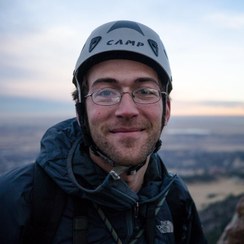Data Awards
The WDS Data Stewardship Award highlights exceptional contributions to the improvement of scientific data stewardship by early career researchers through their (1) engagement with the community, (2) academic achievements, and (3) innovations.
Awardees can be nominated by representatives of any scientific organization, group, body, union, or otherwise. Winners are then selected by a panel of members of the WDS Scientific Committee based on their achievements in the abovementioned areas. To qualify as an early career researcher, nominees must be within ten years of completing their PhD or equivalent professional training.
Check back for nomination announcements in Fall 2022.
Ethan spearheaded the effort to assemble, clean, and document version 3 of the global Glacier Thickness Database (GlaThiDa)—a major advance in the compilation of glacier ice thickness observations
Ethan Welty
2020 WDS Data Stewardship Award Recipient
Ethan Welty is a glaciologist specializing in the analysis of glacier time-lapse photographs. He also works as a scientific data and software consultant for organizations such as the Cascadia Field Station of the United States Geological Survey, Catalyst Cooperative, and the World Glacier Monitoring Service (WGMS, WDS Regular Member).
For the WGMS, Ethan spearheaded the effort to assemble, clean, and document version 3 of the global Glacier Thickness Database (GlaThiDa)—a major advance in the compilation of glacier ice thickness observations, which are fundamental to glacier monitoring and research. In the process, he established a continuous development environment for GlaThiDa to automatically record and verify edits and additions to the dataset as it changes over time. The environment is based on open-source metadata formats and software tools, and is described in https://doi.org/10.5194/essd-12-3039-2020.
Ethan draws on data science as co-founder and director of Falling Fruit, a nonprofit organization mapping edible plants to promote urban foraging in cities worldwide. He is also a professional photographer and an enthusiastic explorer of mountainous and riverine landscapes.
github: https://github.com/ezwelty
Previous Winners
Libby Liggins (2019) is an Associate Professor at Massey University and a Research Associate of the Auckland Museum Tāmaki Paenga Hira in Aotearoa New Zealand. Dr. Liggins leads the Ira Moana – Genes of the Sea – Project that is delivering a searchable metadatabase for New Zealand’s genetic and genomic data. The metadatabase aims to ensure the stewardship of genetic data resources, creating opportunities for data synthesis, helping manage data reuse, and informing future research directions for New Zealand. Metadata Stewardship in Genetic Research: Enabling a Research Community Toward Best-practice https://doi.org/10.5281/zenodo.7094054
Wouter Beek (2018) is an Artificial Intelligence researcher in the Knowledge, Reasoning and Representation(KR&R) group at VU University Amsterdam, collaborating with the institute for Data Archiving and Networked Services in The Hague. Dr Beek is co-developer and principle investigator of the LOD Laundromat: an infrastructure that crawls the web for Linked Open Datasets, cleans them to be standards compliant, and enables them to be accessed through uniform application programming interfaces that ease reuse.
Linhuan Wu (2017) is a data scientist working at the Institute of Microbiology, Chinese Academy of Sciences. Dr Wu has demonstrated excellent innovative capacity for applying cutting-edge IT in the field of Microbiology; focusing on microbial data integration from different data formats and distributed data sources through the use of semantic web technology.
Boris Biskaborn (2016) is a geoscientist at the Alfred Wegener Institute Helmholtz Centre for Polar and Marine Research in Potsdam, Germany, with expertise and involvement in many different scientific endeavours pertaining to the polar regions and data science.View a message from Boris.
Yaxing Wei (2015) is a geospatial information scientist in the Environmental Sciences Division of the Climate Change Science Institute at ORNL who has demonstrated many exceptional contributions to scientific data stewardship in the Environmental and Global Climate Change Sciences.
Xiaogang Ma (2014) is a geoinformatics and data science researcher. His PhD research at ITC, University of Twente was closely related to OneGeology—a global data exchange initiative. He has worked on provenance representation and capture of data in scientific workflows at Rensselaer Polytechnic Institute.
Robert Redmon (2013) is a researcher at National Oceanic and Atmospheric Administration (NOAA) who has demonstrated an amazing capacity for, and dedication to, scientific data stewardship. Within the World Data Service for Geophysics, Dr Redmon is responsible for stewarding, and delivering to the international research community, the space environmental datasets obtained from NOAA’s Polar-orbiting and Geostationary Operational Environmental Satellite systems.


